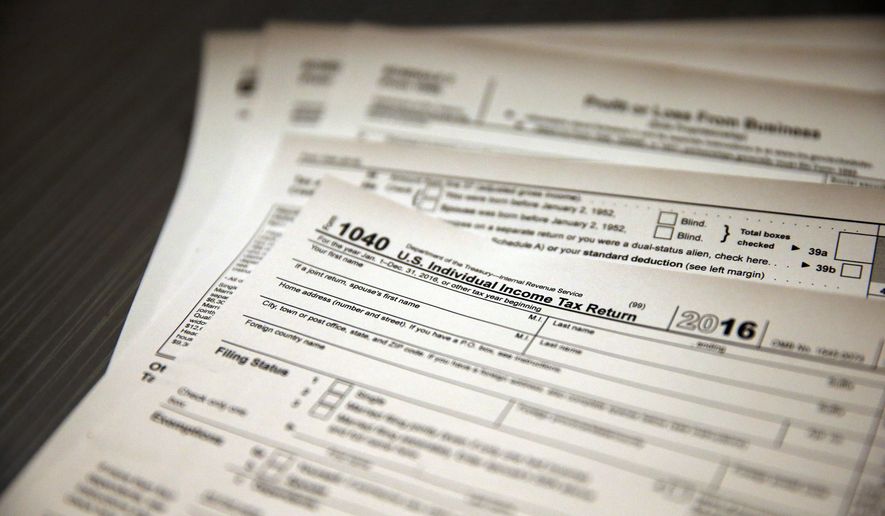Americans racing to Tuesday’s tax deadline can file their returns even if they ignore the line that asks whether they had health insurance last year — an early, visible result of President Trump’s order directing agencies to limit Obamacare’s reach.
The new administration is still trying to grapple with how intensely it will enforce Obamacare, but it announced earlier this year that it won’t reject tax returns just because someone leaves the line about health coverage blank.
The IRS could, though, still follow up with questions — or even an audit — of those who refused to say whether they had coverage, as required for most Americans under the Affordable Care Act’s individual mandate.
“My instinct is that enforcement of the mandate this tax season will be similar to the past year, which is to say that enforcement will not be robust,” said Nicole Elliott, a partner at Holland and Knight who oversaw implementation of Obamacare at the IRS during the last administration.
This was to be the year the IRS got tough.
After several years of lax enforcement, the tax collection agency warned last year that it was going to refuse to accept any returns that didn’t fill out Line 61. The agency reversed course after Mr. Trump was sworn in and issued an executive order calling for leniency in enforcing Obamacare.
TurboTax and H&R Block are among tax-preparation services that quickly updated their software so that customers can submit their returns even if they refuse to certify their health coverage.
“People can go through and not report their health care status and they won’t get rejected,” said Lisa Lewis, a tax expert at TurboTax, a popular online tax-filing service.
Experts said the change won’t have an immediate impact on the Obamacare marketplace. Customers are filing returns that reflect choices they made before Mr. Trump took office and made changes.
Yet it could impact the behavior of taxpayers who lacked insurance in 2016 and are supposed to pay Uncle Sam on Tax Day.
“Do they come clean and report the penalty they owe, or just stay silent about whether they had coverage? These recent events will undoubtedly cause some taxpayers to stay silent and hope the IRS does not come knocking,” Ms. Elliott said.
The tax for lacking insurance started out at just $95 or 1 percent of qualified income in 2014, but it phased into full effect last year, at $695 or 2.5 percent of income.
The IRS didn’t say how aggressive it would be in chasing down that money in its statement on accepting silent returns, yet advised taxpayers they could get follow-up questions or correspondence.
Tax-preparation companies said they’re alerting customers that failure to address their health coverage status could result in follow-up questions or even an audit from the IRS, despite Mr. Trump’s order.
“We are telling our customers the law did not change and you would be required to pay any penalties you owe if (you) didn’t have health insurance, so they really should report their health care status and IRS may follow up with questions or requests,” said Ms. Lewis.
So far, the mandate has proved to be weak in prodding young and healthy people into the marketplace, forcing insurers to either hike premiums or flee certain markets.
More than 19 million people either paid the penalty or sought an exemption from the mandate for 2015, compared to about 12.7 million who sought coverage on the law’s exchanges.
Avalere, a D.C.-based consultancy, said its analyses suggest that more generous tax credits could be a bigger incentive to sign up on Obamacare’s exchanges than a mandate.
“Looking ahead, the IRS’s recent policy shift is not likely to have a significant impact, given the limited effect of the mandate thus far,” said Elizabeth Carpenter, a senior vice president at Avalere.
But Jonathan Gruber, a MIT professor and key architect of Obamacare, argued that Mr. Trump’s direction is clear, in that he is essentially saying, “If you don’t think insurance is a good deal for you this year, don’t sign up.”
“This will worsen the risk pool,” Mr. Gruber said.
• Tom Howell Jr. can be reached at thowell@washingtontimes.com.




Please read our comment policy before commenting.